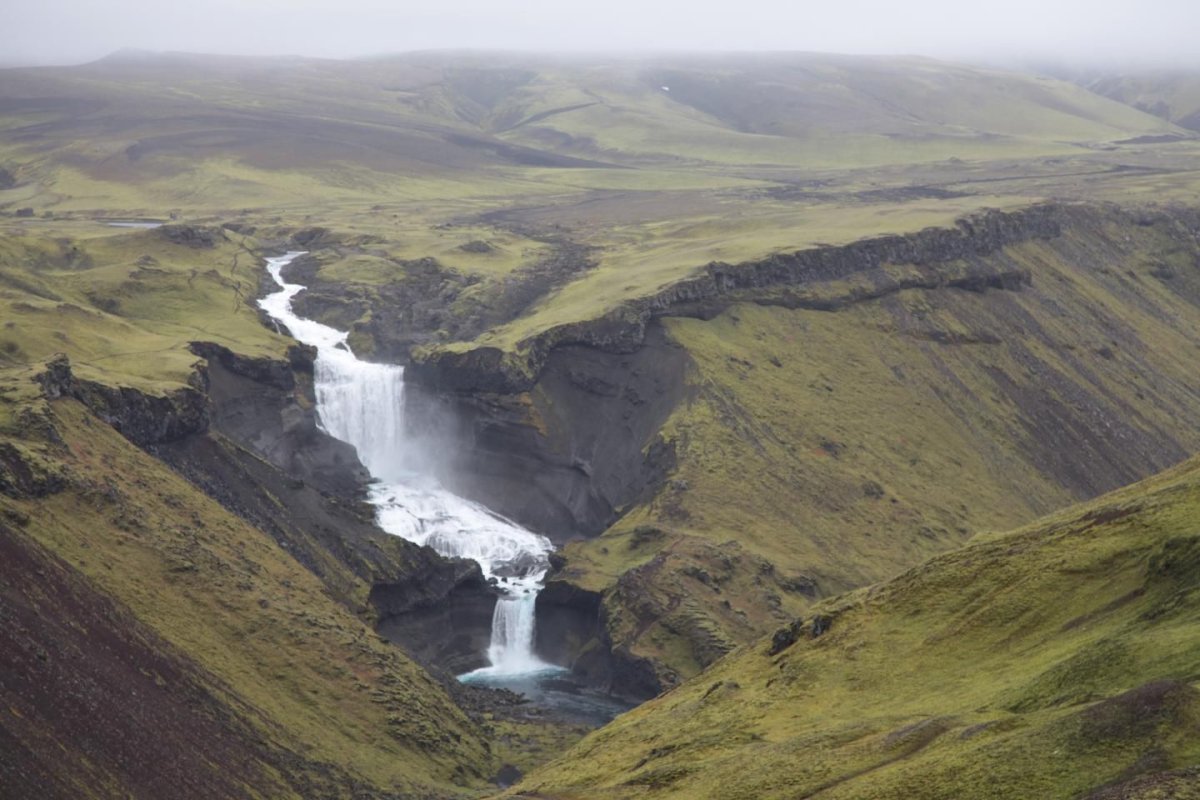
Over 1,000 years ago, Iceland's Eldgjá volcano erupted, sending 4.7 cubic miles of lava across huge swaths of land. But in addition to widespread climate changes after the eruption, the massive event appears to have pushed Iceland's first settlers to drop their pagan beliefs and convert to Christianity, according to a new study published Monday in Climatic Change.
A team of medieval historians and scientists set out to uncover the exact date of the Eldgjá eruption through an analysis of tree rings and ice cores, long cylindrical chunks of ice. Prior to this study, historians were unsure of the exact year of the eruption, which covered the land with lava and spewed sulfurous gases into the air, causing cooler-than-average summers around the world.
The data revealed that the eruption lasted from the spring of 939 to the fall of 940.
"This places the eruption squarely within the experience of the first two or three generations of Iceland's settlers," Clive Oppenheimer, first author and volcanologist at University of Cambridge, said in a statement. "Some of the first wave of migrants to Iceland, brought over as children, may well have witnessed the eruption."
The so-called lava flood of the 10th century devastated communities around the world. "Human suffering in the wake of Eldgjá was widespread," Tim Newfield, co-author and environmental historian at Georgetown University, said in a statement.
Newfield said that northern Europe to northern China experienced long winters and droughts during the spring and summertime. Locusts infestations and livestock deaths were common, while starvation spread across what are now Germany, Iraq and China.
The eruption was so massive it caused global cooling, and Iceland's first settlers were among those who witnessed the eruption. Central Europe, Scandinavia, the Canadian Rockies, Alaska and Central Asia experienced summers 2 degrees Celsius cooler than normal, researchers say.
"This doesn't sound like much, but it is, in fact, a lot and one of the coolest summers in the 1,500-year-long record we have from tree rings," Oppenheimer told Newsweek by email. "These are averaged over quite wide regions of the continents, so there can be even stronger cooling as you 'zoom in.' A 2-degree cooling likely means a shorter growing season and unfavorable weather for crops that would be readily noticed and commented on by farmers."
Pinpointing the date of such massive global change has allowed scientists and medieval historians to come together in order to compare the dates to descriptions in medieval texts. One poem in particular—known as "Voluspá"—stood out to researchers. The widely celebrated Icelandic poem dating back to 961 describes the volcanic eruption as such: "The sun starts to turn black, land sinks into sea; the bright stars scatter from the sky. Steam spurts up with what nourishes life, flame flies high against heaven itself."

The poem uses these apocalyptic scenes to describe the end of Iceland's pagan gods and the beginning of a new single god. The apocalyptic imagery marked an end to the world of old gods, and researchers say that bringing back memories of the eruption two decades after the event itself could have sparked the shift to Christianity at the end of the 10th century.
By the 11th century, the conversion to Christianity in Iceland was formalized, according to researchers.
The collaboration between experts in the humanities, social sciences and natural sciences are what made contextualizing Iceland's history of Christianity possible. "If I had tried to understand the medieval poem 'Voluspá,' I would have confused old and modern Icelandic and the language of poetry versus the language of prose," Oppenheimer told Newsweek. "We think there are important connections between climate and history, but it takes really careful efforts to tease out the numerous factors that make one time and place more or less susceptible to climatic and environmental change than another time or place. … This is where we can draw from an improved understanding of the past to better anticipate and predict how future climates might shape human society."
Uncommon Knowledge
Newsweek is committed to challenging conventional wisdom and finding connections in the search for common ground.
Newsweek is committed to challenging conventional wisdom and finding connections in the search for common ground.
About the writer
Sydney Pereira is a science writer, focusing on the environment and climate. You can reach her at s.pereira@newsweekgroup.com.
To read how Newsweek uses AI as a newsroom tool, Click here.








